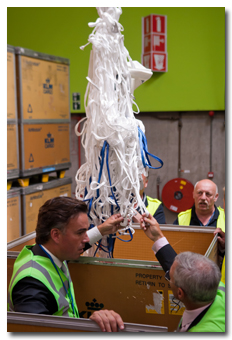TOKYO — July 11, 2013 — Teijin Limited announced today that it has developed a new type of
meta-aramid fiber offering the world’s highest level of heat resistance combined with excellent
dyeablility, which the company will produce in a facility to be built in Ayutthaya Province,
Thailand. Construction begins this December and production is scheduled from July 2015. The newly
developed fiber will strengthen the Teijin group’s global presence in the protective apparel
market, where demand for high-performance materials is increasing.
Teijin will invest around JPY 4.5 billion (US 45 million) to build the plant on the premises
of Teijin (Thailand) Limited. When completed, the plant will nearly double the annual capacity of
Teijin’s global meta-aramid fiber production.
New production technologies developed by Teijin enable the new meta-aramid fiber to achieve
unsurpassed heat resistance and excellent dyeablity, providing customers with more diversified
solutions for the design and manufacture of protective apparel.
“We have supported the global market for protective apparel over decades with our
high-performance materials, such as Teijinconex meta-aramid, Twaron and Technora para-aramid,
Pyromex flame-resistant fiber and since recently with Endumax high-performance polyethylene,” said
Masaya Endo, Teijin group executive officer and general manager of Teijin’s high-performance fibers
business unit. “The new type of meta-aramid fiber strengthens Teijin’s competitiveness in the
emerging economies and Asia, where the demand for heat-proof and flame-retardant high-performance
materials is growing due to increasing safety regulations, and in North America and Europe, where
the demand is high for advanced solutions that combine comfort and maneuverability with high
protection.”
The Teijin group, a world leader in ultra-high performance materials, will continue to
strengthen capabilities in growing markets for protective apparel. The efforts will among others be
supported by collaboration among the group’s Research Center in Osaka, Japan, Development Lab in
Wuppertal, Germany, Research Center in Arnhem, the Netherlands, Technical Center Asia in Shanghai,
China as well as the Iwakuni and the Matsuyama plants in Japan, the Emmen plant in the Netherlands
and in the foreseeable future the new plant in Thailand.
Posted July 16, 2013
Source: Teijin Ltd.





